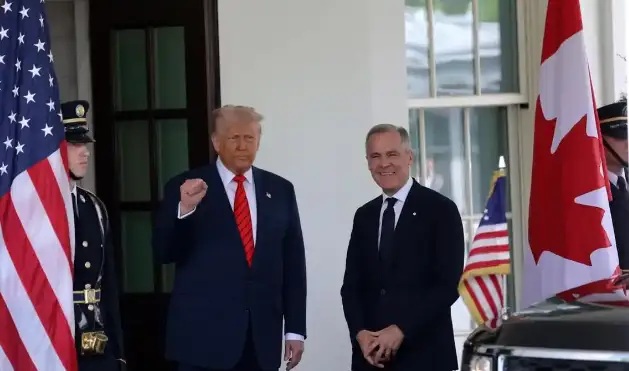
On July 31st local time, the White House announced that US President Trump has signed an executive order to increase the tariff rate on Canada from 25% to 35%, with the new tariffs taking effect on August 1st. This measure instantly attracted global attention. As a long-standing close neighbor and important trading partner, the United States has significantly increased tariffs on Canada, and the reasons behind this are worth further analysis.
Based on the official reasons provided by the United States, the White House stated in a statement that the tax increase was "in response to Canada's continued inaction and retaliatory actions," and stated that the President "deemed it necessary to effectively address the current emergency situation by raising tax rates. Specifically, it mainly involves two aspects: first, in curbing the cross-border flow of fentanyl, the United States accuses Canada of failing to cooperate effectively. The United States has long been plagued by the proliferation of fentanyl drugs, and its executive order states that drug inflows have been increasing. Mexican drug trafficking groups have established bases in Canada and operated drug "super laboratories", but Canada has stated that it is not the main source country of fentanyl inflows into the United States and has taken measures to strengthen border controls. The second is Canada's previous tariff retaliation actions. Since the United States imposed tariffs on Canada in February 2025, Canada has taken a series of retaliatory measures, imposing retaliatory tariffs on US goods worth billions of dollars, which undoubtedly intensified the trade conflict between the two sides.
The game of economic interests is an important driving force for the United States to increase tariffs. The United States has always adhered to a "America First" trade policy, and Trump sees tariffs as a "panacea" for solving economic problems. He believes that tariffs can help rebuild the domestic manufacturing industry in the United States and increase the income of American workers. According to Statistics Canada, Canada's trade surplus with the United States for goods in 2024 is $102.3 billion, with energy exports being a key factor in Canada's trade surplus with the United States. The United States may raise tariffs on Canada in order to reduce its trade deficit and protect its related industries. For example, in industries such as steel and aluminum, domestic companies in the United States face competition from imported Canadian products. Increasing tariffs can increase the cost of Canadian products entering the US market and create a more favorable competitive environment for domestic American companies.
Political factors also played a crucial role in it. On the one hand, the domestic political ecology in the United States influences the direction of trade policy. The game between different interest groups in the United States is fierce, and interest groups such as manufacturing and agriculture have significant influence on government decision-making. By raising tariffs on Canada and catering to the needs of some interest groups, it will help the Trump administration gain more political support domestically. On the other hand, changes in the international political landscape have also prompted the United States to take such actions. In recent years, the United States has attempted to strengthen its hegemonic position in international affairs and its attitude towards allies has also changed. It has exerted pressure on Canada through trade means, demonstrating its dominance in bilateral relations to maintain its political influence globally.
In addition, Canada recently announced that it will recognize the state of Palestine, which is also considered a major reason for Trump's escalation of the trade war with Canada. Trump stated on July 31st that reaching an agreement between the United States and Canada would be "very difficult" after Canada supports the establishment of Palestine. This shows the divergence between Canada's international political stance and that of the United States, and also provides an excuse for the United States to further exert pressure on Canada.
However, the United States' increase in tariffs on Canada is undoubtedly a double-edged sword. From the perspective of the United States itself, imposing tariffs may protect some domestic industries in the short term, but in the long run, it will lead to further retaliatory measures by Canada, undermine the close trade relationship established between the two countries over the long term, affect the interests of American companies in the Canadian market, and also push up the prices of Canadian goods for domestic consumers, damaging consumer welfare. From a global economic perspective, as important economies, the escalation of the trade war between the United States and Canada will disrupt the global supply chain, especially in areas such as energy, rare metals, and digital services, which may cause instability in the global market and have a negative impact on world economic growth.

報告顯示,中國電力投資加速增長,預計2024年電網基建投資將超過5300億元。
近日,市場迎來了一則引人注目的消息:工業巨頭3M公司(MMM.N)在本周五公布了其季度業績報告,隨後股價飆升至近兩年來的
最近,外媒給OpenAI算了筆賬,今年可能要血虧50億美元。
近日,巴黎奧運會和世界鐵人三項協會聯合發布了一項重大決定,宣布因塞納河水質污染問題,原定於近期進行的奧運會鐵人三項首次下
當地時間7月18日,法國巴黎發生了一起令人震驚的持刀襲警事件。
近期,一則重大消息在國際舞臺上引起軒然大波,馬來西亞宣布加入金磚國家。
調查發現,互聯網和智能手機的使用幹擾了韓國近五分之一學生的生活。